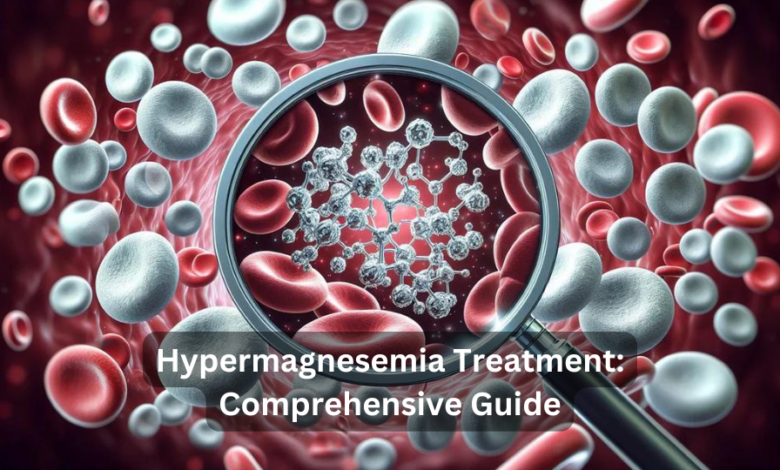Hypermagnesemia Treatment: Comprehensive Guide

Hypermagnesemia is a rare electrolyte imbalance that occurs when there is an excess of magnesium in the blood. Magnesium plays a crucial role in numerous physiological functions, including muscle and nerve regulation, protein synthesis, and maintaining blood glucose levels. However, elevated levels of magnesium can lead to serious health complications and require immediate treatment. In this article, we will delve into the various treatment options for hypermagnesemia, providing a comprehensive, up-to-date guide as of September 2024.
Understanding Hypermagnesemia
Magnesium is primarily stored in bones and soft tissues, with less than 1% circulating in the blood. Normal serum magnesium levels range between 1.7 to 2.2 mg/dL, and hypermagnesemia is diagnosed when levels exceed 2.5 mg/dL.
The primary cause of hypermagnesemia is impaired kidney function, as the kidneys are responsible for filtering and excreting excess magnesium. Additional causes include overuse of magnesium-containing medications such as laxatives or antacids, particularly in individuals with pre-existing kidney conditions.
Symptoms of Hypermagnesemia
Symptoms of hypermagnesemia vary depending on the severity of the condition. Mild cases may be asymptomatic, while more severe cases can present with:
- Nausea and vomiting
- Hypotension (low blood pressure)
- Bradycardia (slow heart rate)
- Lethargy or confusion
- Muscle weakness
- Cardiac arrhythmias
- Respiratory depression
Severe hypermagnesemia, with levels greater than 6 mg/dL, can be life-threatening, causing cardiac arrest or coma.
Diagnosing Hypermagnesemia
Hypermagnesemia is diagnosed through serum magnesium testing. Physicians may also order additional tests to assess the underlying cause and the extent of complications, such as electrolyte panels to check for accompanying imbalances like hypocalcemia (low calcium levels) and hyperkalemia (high potassium levels). ECG monitoring may be necessary to detect any cardiac abnormalities.
Immediate Treatment for Hypermagnesemia
The treatment for hypermagnesemia depends on the severity of the condition and the underlying cause. Immediate interventions are required for moderate to severe cases where serum magnesium levels exceed 4 mg/dL.
1. Discontinuation of Magnesium-Containing Medications
The first step in treating hypermagnesemia is stopping all magnesium-containing medications or supplements. This includes antacids, laxatives, or any other over-the-counter drugs that may contain magnesium.
2. Hydration and Forced Diuresis
In cases where kidney function is still adequate, intravenous fluids are administered to promote urine output and enhance the excretion of magnesium. Saline infusion (0.9% NaCl) is commonly used to facilitate this process.
Loop diuretics, such as furosemide, can be prescribed to encourage the kidneys to excrete more magnesium through urine. This treatment is particularly effective when the hypermagnesemia is not severe and kidney function is intact.
3. Calcium Administration
For symptomatic patients, particularly those experiencing cardiac or neuromuscular complications, intravenous calcium is the first-line treatment. Calcium helps counteract the effects of elevated magnesium on the cardiovascular system by stabilizing the heart and preventing arrhythmias.
Common calcium preparations include:
- Calcium gluconate (10% solution)
- Calcium chloride
Calcium is administered as a slow IV infusion, typically in doses of 1-2 grams. This temporarily reverses the cardiac and neuromuscular effects of hypermagnesemia but does not reduce serum magnesium levels. Therefore, it is often used in conjunction with other treatments.
4. Hemodialysis
For patients with severe hypermagnesemia (levels greater than 6 mg/dL) or those with impaired renal function, hemodialysis is the most effective treatment. Hemodialysis rapidly clears excess magnesium from the bloodstream, especially in patients who cannot excrete magnesium adequately through their kidneys.
Dialysis is indicated for patients with:
- Severe symptoms such as respiratory depression or cardiac arrest
- Kidney failure or acute kidney injury
- Inadequate response to other treatments such as IV fluids or diuretics
Dialysis treatment involves passing the patient’s blood through a machine that filters out excess electrolytes, including magnesium. This can quickly restore magnesium levels to a normal range, often within a few hours.
5. Magnesium Chelating Agents
In rare and extreme cases where hemodialysis is not immediately available, magnesium chelating agents like sodium polystyrene sulfonate may be used. These agents help bind magnesium in the gut, reducing its absorption and promoting its elimination through the stool.
Ongoing Management and Prevention
Once acute hypermagnesemia is resolved, ongoing management focuses on preventing recurrence. Patients with chronic kidney disease or those at high risk of hypermagnesemia should be closely monitored.
1. Regular Monitoring of Magnesium Levels
For individuals with underlying kidney conditions or those on magnesium-containing medications, regular serum magnesium testing is crucial. This is especially important for elderly patients or those with chronic kidney disease (CKD) who are at a higher risk of developing hypermagnesemia.
2. Dietary Modifications
Patients prone to hypermagnesemia may benefit from dietary modifications to reduce magnesium intake. Foods high in magnesium include:
- Leafy green vegetables (spinach, kale)
- Nuts and seeds
- Whole grains
- Legumes
- Fish
For high-risk patients, it is advisable to limit the intake of these magnesium-rich foods under the guidance of a healthcare provider or registered dietitian.
3. Adjusting Medications
Patients with kidney issues should avoid or use caution with over-the-counter magnesium supplements and medications like laxatives and antacids. Healthcare providers may recommend alternative treatments that do not contain magnesium to prevent electrolyte imbalances.
4. Kidney Function Optimization
Since hypermagnesemia is closely linked to kidney function, patients should work closely with a nephrologist to optimize kidney health. This may involve controlling blood pressure, managing diabetes, and adhering to a renal-friendly diet. Regular kidney function tests, such as eGFR (estimated glomerular filtration rate), can help monitor and manage the risk of hypermagnesemia.
Prognosis of Hypermagnesemia
The prognosis for hypermagnesemia largely depends on the severity of the condition and the patient’s overall health. Mild cases with prompt treatment typically have an excellent prognosis, with full recovery. However, severe hypermagnesemia can be life-threatening, particularly in patients with advanced kidney disease or heart conditions. In such cases, rapid intervention with calcium, fluids, and hemodialysis is essential to prevent permanent damage or death.
Long-term Outlook
Patients with chronic kidney disease or those who regularly take magnesium-containing medications are at a higher risk of recurrent hypermagnesemia. Close medical supervision, regular lab testing, and careful medication management are crucial for these patients to prevent recurrence and maintain electrolyte balance.
Conclusion: Comprehensive Care for Hypermagnesemia
Hypermagnesemia is a serious medical condition that requires prompt diagnosis and treatment. While it is a rare condition, it can occur in patients with impaired kidney function, or those who take magnesium-containing medications. The cornerstone of treatment is discontinuing any magnesium sources, administering IV fluids, using calcium infusions for symptomatic relief, and implementing hemodialysis in severe cases.
For long-term management, regular monitoring, dietary adjustments, and medication reviews are essential to prevent recurrence. Patients with chronic kidney disease should be particularly vigilant, working closely with their healthcare team to maintain kidney health and prevent hypermagnesemia. As of September 2024, advancements in treatment options and understanding of the condition continue to improve outcomes for patients suffering from this electrolyte imbalance.
For more in-depth information, patients can consult resources such as the National Kidney Foundation or visit a local nephrologist to receive personalized care and guidance.
External Links
This comprehensive guide aims to provide all necessary information to effectively manage and treat hypermagnesemia, ensuring patient safety and promoting long-term health.
